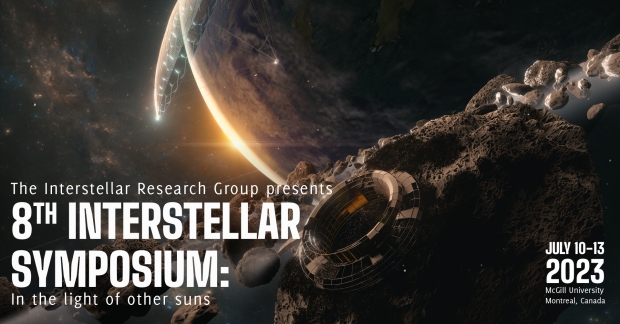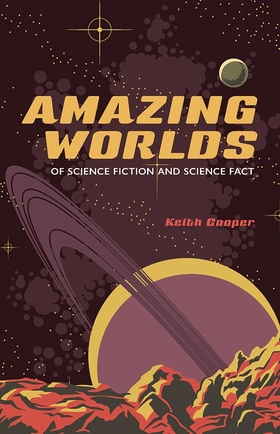Abstract Submission Final Deadline: April 21, 2023
The Interstellar Research Group (IRG) in partnership with the International Academy of Astronautics (IAA) hereby invites participation in its 8th Interstellar Symposium, hosted by McGill University, to be held from Monday, July 10 through Thursday, July 13, 2023, in Montreal, Quebec, Canada. This is the first IRG meeting outside of the United States, and we are excited to partner with such a distinguished institution!
Topics of Interest
Physics and Engineering
Propulsion, power, communications, navigation, materials, systems design, extraterrestrial resource utilization, breakthrough physics
Astronomy
Exoplanet discovery and characterization, habitability, solar gravitational focus as a means to image exoplanets
Human Factors
Life support, habitat architecture, worldships, population genetics, psychology, hibernation, finance
Ethics
Sociology, law, governance, astroarchaeology, trade, cultural evolution
Astrobiology
Technosignature and biosignature identification, SETI, the Fermi paradox, von Neumann probes, exoplanet terraformation
Submissions on other topics of direct relevance to interstellar travel are also welcome. Examples of presentations at past symposia can be found here:
https://www.youtube.com/c/InterstellarResearchGroup/videos
Confirmed Speakers
Dr. Stephen Webb (University of Portsmouth)
“Silence is Golden: SETI and the Fermi Paradox”
Dr. Kathryn Denning (York University)
“Anthropological Observations for Intestellar Aspirants”
Dr. Rebecca M. Rench (Planetary Science Division, NASA Headquarters)
“The Search for Life and Habitable Worlds at NASA: Past, Present and Future”
Dr. Frank Tipler (Tulane University)
“The Ultimate Rocket and the Ultimate Energy Source and their Use in the Ultimate Future”
Contributed Plenary Lectures
The primary submissions for the Interstellar Symposium are plenary lectures. The lectures will be approximately 20 minutes in length and be accompanied by a manuscript prior to the Symposium. The early bird deadline for abstract submission, which ensures expedited consideration and notification of acceptance, is January 15, 2023. Submitted abstracts will continue to be considered until April 21, 2023, if space in the program permits. The submitted abstract should follow the format described in the Abstract Submission section below. Abstracts should be emailed to: registrar@irg.space
No Paper, No Podium: Contributed plenary lectures are to be accompanied by a written paper, with an initial draft due June 23, 2023. You will have an opportunity to revise and extend your draft before the publication deadline of September 8, 2023. If a paper is not submitted by the final manuscript deadline, authors will not be permitted to present their work. Papers should be original work that has not been previously published.
Work in Progress Posters
Contributors wishing to present projects still in progress or at a preliminary stage may submit an abstract for a Work in Progress poster presentation. The deadline for abstract submission for Work in Progress posters is May 20, 2023. The abstract describing the work to be presented should follow the format described in the Abstract Submission section below. The poster should not exceed 36 inch (width) by 48 inch (height). The presenters are responsible for printing their own posters and would need to bring their poster to the Interstellar Symposium. Abstracts should be emailed to: registrar@irg.space
Sagan Meetings
An interested Sagan Meeting organizer is given the option to define a particular question for an in-depth panel discussion. The organizer would be responsible for inviting five speakers to give short presentations staking out a position on a particular question. These speakers will then form a panel to engage in a lively discussion with the audience on that topic. Carl Sagan famously employed this format for his 1971 conference at the Byurakan Observatory in old Soviet Armenia, which dealt with the Drake Equation. A one-page description (format of your choosing) of the panel topic, the questions to be addressed, and the suggested panel members should be emailed by January 15, 2023 to: registrar@irg.space
Seminars
Seminars are 3-hour presentations on a single subject, providing an in depth look at that subject. Seminars are held before the Symposium begins, on Sunday, July 9, 2023, with morning and afternoon sessions. The content must be acceptable to be counted as continuing education credit for those holding a Professional Engineer (PE) certificate.
Other Content
Other content includes, but is not limited to, posters, displays of art or models, demonstrations, panel discussions, interviews, or public outreach events. IRG recognizes the importance of a holistic human cultural experience and encourages the submission of non-academic works to be involved with the symposium program.
Publications
The IRG serves as a critical incubator of ideas for the interstellar community. Following the success of the 7th Interstellar Symposium, papers may be submitted for consideration in publication within a special issue of Acta Astronautica. Papers from the 7th Symposium (September 2021) have now been published in the August 2022 issue of Acta Astronautica. Contributors who wish to publish their papers elsewhere may do so. Abstracts and papers not published elsewhere will be compiled into a complete Symposium proceedings in book form.
Video and Archiving
All symposium events may be captured on video or in still images for use on the IRG website, in newsletters and social media. All presenters, speakers, and selected participants will be asked to complete a Release Form that grants permission for IRG to use this content as described.
Abstract Submission
Abstracts for the 8th Interstellar Symposium must relate to one or more of the many interstellar mission related topics. The previously listed topics are not exclusive but represent a cross-section of possible categories. All abstracts must be submitted online via email to: registrar@irg.space.
Acceptable formats are text, Microsoft Word, and PDF only. Submissions of Contributed Plenary Lectures and Work in Progress Posters must follow the format described below.
Presenting Author(s)
Please list only the author(s) who will actually be in attendance and presenting at the conference. (First name, last name, degree – for example, Susan Smith, MD)
Additional Author(s)
List all authors here, including Presenting Author(s) – (first name, last name, degree(s) – for example, Mary Rockford, RN; Susan Smith, MD; John Jones, PhD)
Abbreviation(s)
Abbreviations within the body should be kept to a minimum and must be defined upon first use in the abstract by placing the abbreviation in parenthesis after the represented full word or phrase. Non-proprietary (generic) names should be used.
Abstract Length
The entire abstract (excluding title, authors, presenting author’s institutional affiliation(s), city, state, and text) including any tables or figures should be a maximum of 350 words. It is your responsibility to verify compliance with the length requirement.
Abstract Structure
Abstracts must include the following headings:
- Title = The presentation title.
- Background = Describes the research or initiative context.
- Objective = Describes the research or initiative objective.
- Methods = Describes research methodology used. For initiatives, describes the target population, program or curricular content, and evaluation method.
- Results – Summarizes findings in sufficient detail to support the conclusions.
- Conclusion – States the conclusions drawn from results, including their applicability.
Questions and responses to this call for papers, workshops, and participation should be directed to:
For updates on the meeting, speakers, and logistics, please refer to the website:




Will the 8th Interstellar Symposium be broadcast on the youtube ?
I know the talks will be available on YouTube at some point, but I don’t know if live streaming will be offered. I should have that information shortly.
Paul, Charlie,
No live streaming will be available this time, but the talks will be recorded, edited, and available on the YouTube site month or r the event concludes.